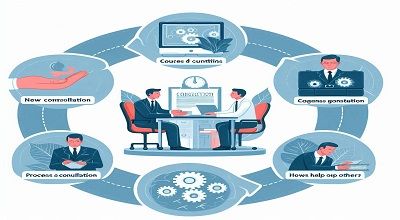Process Consultation
The Process of consultation is a concept developed by organizational psychologist Edgar H. Schein. It refers to a method of helping individuals and groups within an organization improve their problem-solving and interpersonal skills. The primary goal of process consultation is to enhance the organization’s capacity to solve problems, manage conflicts, and improve overall effectiveness.
Here’s how The process of consultation works and how it helps others:
Diagnosis and Assessment:
Process consultants start by understanding the existing dynamics within a group or organization. This involves observing interactions, gathering information, and conducting interviews to identify areas that need improvement.
Feedback:
Consultants provide feedback to individuals or groups based on their observations and assessments. This feedback is designed to increase awareness of behaviors. Communication patterns, and other factors influencing the group’s effectiveness.
Collaborative Problem-Solving:
Process consultants work collaboratively with individuals or groups to identify and define problems. They facilitate discussions to encourage open communication and the exploration of different perspectives.
Skill Development:
Through the process, individuals and groups are guided in developing new skills. Such as effective communication, conflict resolution, decision-making, and problem-solving. This skill development aims to empower individuals to handle similar issues independently in the future.
Building Trust and Relationships:
Process consultants focus on building trust and positive relationships within the organization. This helps create a supportive environment where individuals feel comfortable sharing their thoughts and concerns.
Promoting Self-Reflection:
Process consultation encourages self-reflection among individuals and groups. Participants are prompted to examine their own behaviors. Assumptions, and contributions to group dynamics.
Systemic Change:
Process consultation goes beyond addressing individual issues; it aims to bring about systemic change within the organization. By addressing underlying patterns and structures, consultants help create a more adaptive and resilient organizational culture.
Customized Approach:
Process consultation is not a one-size-fits-all approach. Consultants tailor their interventions to the specific needs and context of the organization, recognizing that each situation is unique.
Long-Term Impact:
The goal of process consult is to create lasting change. By empowering individuals and groups with the skills and awareness to navigate challenges, the impact extends beyond the immediate consultation period.
Final Words
Overall, The process of consultation is a humanistic and participatory approach to organizational development. It emphasizes collaboration, open communication, and the empowerment of individuals and groups to enhance their problem-solving capabilities and contribute to the overall success of the organization.
